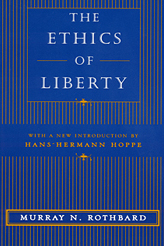

Murray Rothbard's greatest contribution to the politics of freedom is back in print. Following up on Mises's demonstration that a society without private property degenerates into economic chaos, Rothbard shows that every interference with property represents a violent and unethical invasion that diminishes liberty and prosperity.
First published in 1982, The Ethics of Liberty is a masterpiece of argumentation, and shockingly radical in its conclusions. Rothbard says that the very existence of the state — the entity with a monopoly privilege to invade private property — is contrary to the ethics of liberty. A society without a state is not only viable; it is the only one consistent with natural rights.
When it first appeared, the book was ignored by the scholarly world. Robert Nozick's treatise, taking a much softer view, was heralded instead. Nozick has since moved on to social democracy. Meanwhile, Rothbard's primary philosophical work went out of print and then virtually disappeared. Foreign-language editions have appeared, but the English version was unavailable.
But times have changed. For believers in liberty, Rothbard is an invaluable intellectual asset. At last, his most rigorous argument is available again, and in the stirring prose he is famous for.
In this volume, Rothbard first familiarizes the reader with Natural Law theory. After this ethical introduction, he goes on to address numerous ethical issues, showing how liberty is in the right in every case. In the final two sections, Rothbard enumerates the state's role in society as inherently anti-liberty, and details the structure of alternate theories of liberty.